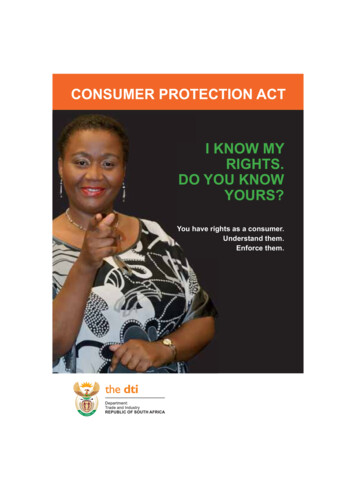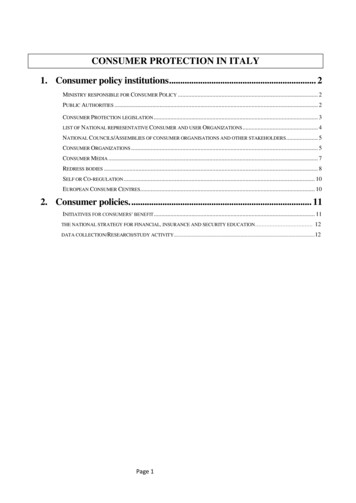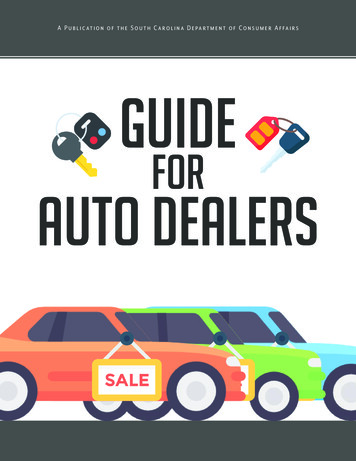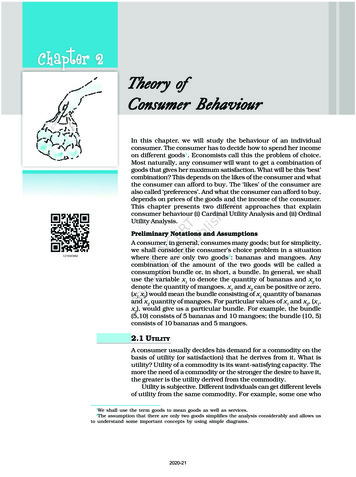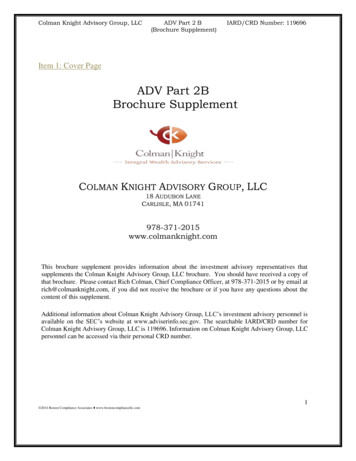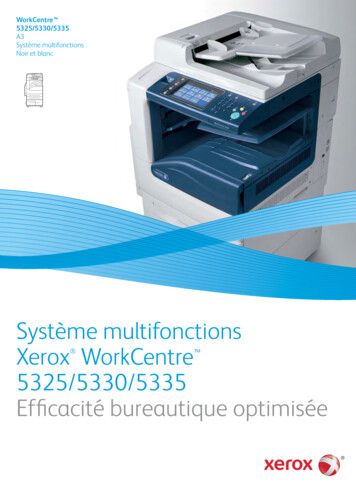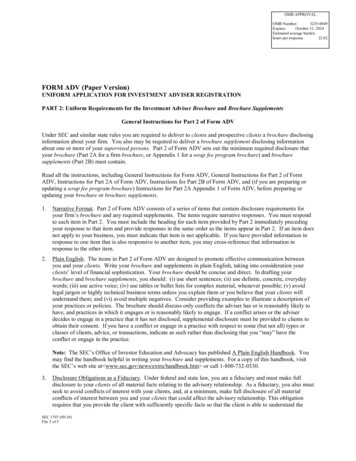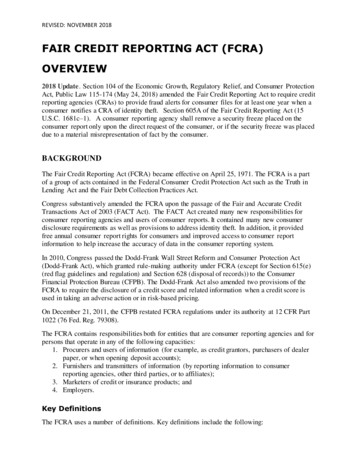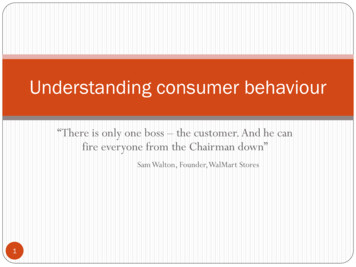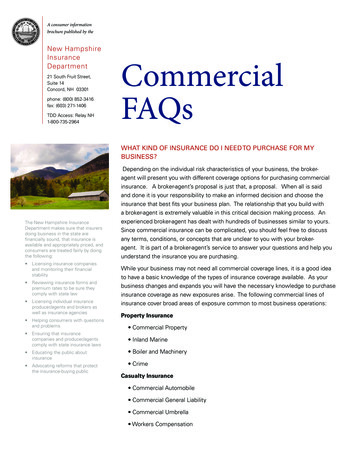
Transcription
A consumer informationbrochure published by theNew HampshireInsuranceDepartment21 South Fruit Street,Suite 14Concord, NH 03301phone: (800) 852-3416fax: (603) 271-1406TDD Access: Relay NH1-800-735-2964CommercialFAQsWhat Kind of Insurance Do I Need to Purchase for MyBusiness?The New Hampshire InsuranceDepartment makes sure that insurersdoing business in the state arefinancially sound, that insurance isavailable and appropriately priced, andconsumers are treated fairly by doingthe following: Licensing insurance companiesand monitoring their financialstability Reviewing insurance forms andpremium rates to be sure theycomply with state law Licensing individual insuranceproducer/agents and brokers aswell as insurance agencies Helping consumers with questionsand problems Ensuring that insurancecompanies and producer/agentscomply with state insurance laws Educating the public aboutinsurance Advocating reforms that protectthe insurance-buying publicDepending on the individual risk characteristics of your business, the brokeragent will present you with different coverage options for purchasing commercialinsurance. A broker-agent’s proposal is just that, a proposal. When all is saidand done it is your responsibility to make an informed decision and choose theinsurance that best fits your business plan. The relationship that you build witha broker-agent is extremely valuable in this critical decision making process. Anexperienced broker-agent has dealt with hundreds of businesses similar to yours.Since commercial insurance can be complicated, you should feel free to discussany terms, conditions, or concepts that are unclear to you with your brokeragent. It is part of a broker-agent’s service to answer your questions and help youunderstand the insurance you are purchasing.While your business may not need all commercial coverage lines, it is a good ideato have a basic knowledge of the types of insurance coverage available. As yourbusiness changes and expands you will have the necessary knowledge to purchaseinsurance coverage as new exposures arise. The following commercial lines ofinsurance cover broad areas of exposure common to most business operations:Property Insurance Commercial Property Inland Marine Boiler and Machinery CrimeCasualty Insurance Commercial Automobile Commercial General Liability Commercial Umbrella Workers Compensation
2New HampshireInsuranceDepartmentCommercialFAQsWhat Is a Business Owners Policy?Designed specifically for small businesses, a Business Owners Policy (BOP)is a combination commercial policy that covers property, general liability andbusiness interruption. It is written with strict underwriting guidelines includingmaximum allowable square footage for office, retail, or apartment risks. A BOP ismost appropriate for small, “main street” businesses such as: hardware stores,barbershops, greeting card shops, accountant offices, or low-density apartmenthouses. Discuss the option of a BOP with your broker-agent, as the premium forqualifying businesses can be very competitive.What is a Commercial Package Policy (CPP)?Commercial risk insurance provides more than one type of coverage, such ascommercial property, commercial crime, commercial and general liability.What is the difference between a BOP (businessownerspolicy) and CPP (commercial package policy)?A BOP is a bundled package of coverages designed for the average small- to mediumsized risk. A CPP is more of a cafeteria style policy where each coverage is tailoredto the specific risk and needs of the business. The CPP is used most often in largebusinesses and those small- and medium-sized businesses that are more unique orwith special needs.I am operating a small business from my home. Does myhomeowner’s policy automatically cover the businessactivities?The homeowners policy specifically excludes liability coverage for business operationsso it is incorrect to assume that coverage automatically exists. Many companies,however, are willing to add business liability coverage by endorsement to the policyfor an additional fee but only for some lower risk types of business operations. If youare operating a business from home, it is important for you to discuss what you aredoing with your agent/company so you can determine just what you have coveragefor and what you don’t. This applies to both business liability and business personalproperty.What coverage is provided by “Business InterruptionInsurance “Profits you would have earned, based on your financial records, had your property notbeen damaged by the covered disaster.Operating expenses, such as electricity, that may occur even if the main businessactivities are temporarily stalled.Some policies cover expenses incurred from operating out of a temporary locationwhile the original premises are being repaired.
3New HampshireInsuranceDepartmentCommercialFAQsAs a new small business venture, do I have to register withthe state in any way?A person conducting business under any name other than his/her own legal namemust register. For example, John D. Smith doing business as “John D. Smith” doesnot have to. However, if he conducts business as “John Smith Enterprises,” he doeshave to register, as “Enterprises” is not part of his legal ur-business.aspxAfter an inspector from the company reviewed my property,I received a list of “recommendations” the insurancecompany is requiring me to address. Is this legal?Yes. Whereas the insurer is providing coverage for losses occurring at your premisesor as a result of your business operations, it has a vested interest in the exposuresthat are likely to lead to a loss. You have a responsibility to control those exposureswhere possible. Under New Hampshire law, an insurer may cancel your policy, if youfail to comply with reasonable loss control recommendations.What are some tips and considerations for loweringProperty & Liability Insurance Costs? Review all insurance policies annually and note any changes that may affect yourcoverage costs. For example, your premiums could be impacted by the additionor reduction of employees, product offerings or inventory, modifications to yourbuilding, or changed state regulations. Find out how plans differ to make sure you are purchasing the best policy for yourparticular business and at a competitive price. Claim a tax deduction for your premiums on fire, casualty and burglary insurance. Avoid purchasing overlapping policies. Read the terms carefully to make sure youare not covered for the same item in two separate policies. This type of policyexamination also helps you ensure that you are not missing crucial coverage inother areas. NOTE: To help with claims processing: Document all your business assets, and keep detailed records of all your insurancepolicies, as well as copies of premiums you’ve paid and any documents concerninglosses and recoveries.
4New HampshireInsuranceDepartmentMy business suffered flood damage as a result of heavyrains causing a nearby body of water to flood the area.Is it covered under my Businessowners or Commercialproperty insurance?CommercialFAQsFlood damage or damage caused by rising stream, river or lake levels, or rising groundwater typically will only be covered if you purchased flood insurance through theNational Flood Insurance Program (NFIP). This type of damage is not covered undera typical property insurance policy. Policyholders should first contact their agent fortheir policy to report flood damage. For additional information go to “Floods Happen”at www.floodsmart.gov. NFIP coverage information is available for various audiencesat http://www.fema.gov/business/nfip.My business operation involves the manufacturing ofa tangible product. Does a general liability policyprotect me?The general liability (Premises/Operations) policy would respond to bodily injury andproperty damage claims that occurred as a result of an accident on the premises orwork site - i.e., a slip and fall type claim. Injury as a result of a product manufacturedby the business is not covered by the general liability or BOP. Manufacturing typebusinesses need to carry Products/Completed Operations liability coverage which isspecifically designed to respond to claims by people who are injured as a result of theproduct they bought from or through you.I use my personal automobile in my small business. Am Icovered if an accident happens?Private passenger automobile policies will have an exclusion for business use of thevehicle. Typically there would be no coverage for an accident if it occurred while beingused for business. Some companies do, for an additional charge, have endorsementsfor some low-risk types of businesses - i.e., real estate agents, Tupperware sales, orinsurance agents. Discuss with your agent how your company treats this situationas companies may differ in their interpretation of what constitutes business use. Inthose situations where the private passenger automobile policy does not providecoverage, you will need to consider a commercial automobile policy.What is the difference between general liability andprofessional liability?A general liability policy covers bodily injury and property damage claims that resultfrom your negligence on your premises or as a result of your operations includingactions of your employees. Examples are: You failed to remove ice from the entry way to your store and a customer slipsand falls. Your employee is using a fork lift to help load your customer’s purchase in the backof a pickup truck and accidentally damages the pickup truck in the process.
5New HampshireInsuranceDepartmentA professional liability policy covers physical and financial injury that may occur tosomeone as a result of a service provided or a failure to provide in a professionalcapacity (errors and omissions). Examples of some professions are: ArchitectCommercialFAQs Beautician or barber Chiropractor Dentist Doctor Engineer Lawyer Nurse RealtorTo illustrate: A beautician/stylist tries a new hair treatment and the chemicals in thetreatment burn the scalp of the client requiring medical treatment.If I have additional questions or am not satisfied with theservice that my agent or insurance company has provided,how do I contact the Department of Insurance?You may reach a Consumer Services Representative at 800-852-3416 or603-271-2261.
a broker-agent is extremely valuable in this critical decision making process. An experienced broker-agent has dealt with hundreds of businesses similar to yours. Since commercial insurance can be complicated, you should feel free to discuss any terms, conditions, or concepts that are unclear to you with your broker-agent.
